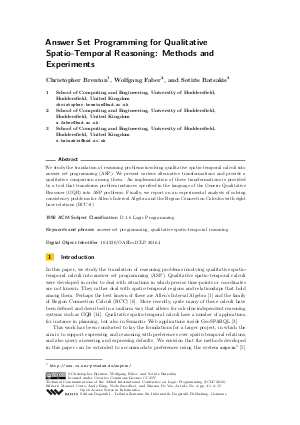Answer Set Programming for Qualitative Spatio-Temporal Reasoning: Methods and Experiments
Authors Christopher Brenton, Wolfgang Faber, Sotiris Batsakis
-
Part of:
Volume:
Technical Communications of the 32nd International Conference on Logic Programming (ICLP 2016) (ICLP 2016 TCs)
Part of: Series: Open Access Series in Informatics (OASIcs)
Part of: Conference: International Conference on Logic Programming (ICLP) - License:
 Creative Commons Attribution 3.0 Unported license
Creative Commons Attribution 3.0 Unported license
- Publication Date: 2016-11-11
File

PDF
OASIcs.ICLP.2016.4.pdf
- Filesize: 0.52 MB
- 15 pages
Document Identifiers
Subject Classification
Keywords
- answer set programming
- qualitative spatio-temporal reasoning
Metrics
- Access Statistics
-
Total Accesses (updated on a weekly basis)
0PDF Downloads0Metadata Views
Abstract
We study the translation of reasoning problems involving qualitative spatio-temporal calculi into answer set programming (ASP). We present various alternative transformations and provide a qualitative comparison among them. An implementation of these transformations is provided by a tool that transforms problem instances specified in the language of the Generic Qualitative Reasoner (GQR) into ASP problems. Finally, we report on an experimental analysis of solving consistency problems for Allen's Interval Algebra and the Region Connection Calculus with eight base relations (RCC-8).
Cite As Get BibTex
Christopher Brenton, Wolfgang Faber, and Sotiris Batsakis. Answer Set Programming for Qualitative Spatio-Temporal Reasoning: Methods and Experiments. In Technical Communications of the 32nd International Conference on Logic Programming (ICLP 2016). Open Access Series in Informatics (OASIcs), Volume 52, pp. 4:1-4:15, Schloss Dagstuhl – Leibniz-Zentrum für Informatik (2016)
https://doi.org/10.4230/OASIcs.ICLP.2016.4
BibTex
@InProceedings{brenton_et_al:OASIcs.ICLP.2016.4,
author = {Brenton, Christopher and Faber, Wolfgang and Batsakis, Sotiris},
title = {{Answer Set Programming for Qualitative Spatio-Temporal Reasoning: Methods and Experiments}},
booktitle = {Technical Communications of the 32nd International Conference on Logic Programming (ICLP 2016)},
pages = {4:1--4:15},
series = {Open Access Series in Informatics (OASIcs)},
ISBN = {978-3-95977-007-1},
ISSN = {2190-6807},
year = {2016},
volume = {52},
editor = {Carro, Manuel and King, Andy and Saeedloei, Neda and De Vos, Marina},
publisher = {Schloss Dagstuhl -- Leibniz-Zentrum f{\"u}r Informatik},
address = {Dagstuhl, Germany},
URL = {https://drops.dagstuhl.de/entities/document/10.4230/OASIcs.ICLP.2016.4},
URN = {urn:nbn:de:0030-drops-67352},
doi = {10.4230/OASIcs.ICLP.2016.4},
annote = {Keywords: answer set programming, qualitative spatio-temporal reasoning}
}
Author Details
References
-
James F. Allen. An interval-based representation of temporal knowledge. In Patrick J. Hayes, editor, Proceedings of the 7th International Joint Conference on Artificial Intelligence (IJCAI'81), Vancouver, BC, Canada, August 1981, pages 221-226. William Kaufmann, 1981.

-
Chitta Baral. Knowledge Representation, Reasoning and Declarative Problem Solving. Cambridge University Press, 2003.

-
Robert Battle and Dave Kolas. Enabling the geospatial semantic web with parliament and geosparql. Semantic Web, 3(4):355-370, 2012.

-
Christopher Brenton, Wolfgang Faber, and Sotiris Batsakis. Solving qualitative spatio-temporal reasoning problems by means of answer set programming: Methods and experiments. In Proceedings of the Eighth Workshop on Answer Set Programming and Other Computing Paradigms (ASPOCP 2015), Cork, Ireland, 2015.

-
Gerhard Brewka, James P. Delgrande, Javier Romero, and Torsten Schaub. Implementing preferences with asprin. In Francesco Calimeri, Giovambattista Ianni, and Miroslaw Truszczynski, editors, Logic Programming and Nonmonotonic Reasoning - 13th International Conference (LPNMR 2015), volume 9345 of Lecture Notes in Computer Science, pages 158-172. Springer, 2015.

-
Anthony G. Cohn, Brandon Bennett, John Gooday, and Nicholas Mark Gotts. Qualitative spatial representation and reasoning with the region connection calculus. GeoInformatica, 1(3):275-316, 1997.

-
Martin Gebser, Roland Kaminski, Benjamin Kaufmann, and Torsten Schaub. Answer Set Solving in Practice. Synthesis Lectures on Artificial Intelligence and Machine Learning. Morgan and Claypool Publishers, 2012.

-
Michael Gelfond and Vladimir Lifschitz. The Stable Model Semantics for Logic Programming. In Logic Programming: Proceedings Fifth Intl Conference and Symposium, pages 1070-1080, Cambridge, Mass., 1988. MIT Press.

-
Jason Jingshi Li. Qualitative spatial and temporal reasoning with answer set programming. In IEEE 24th International Conference on Tools with Artificial Intelligence, ICTAI 2012, pages 603-609, 2012.

-
Till Mossakowski and Reinhard Moratz. Qualitative reasoning about relative direction of oriented points. Artificial Intelligence, 180-181:34-45, 2012.

-
Jochen Renz and Bernhard Nebel. Efficient methods for qualitative spatial reasoning. Journal of Artificial Intelligence Research, 15:289-318, 2001.

-
Jochen Renz and Bernhard Nebel. Qualitative spatial reasoning using constraint calculi. In Marco Aiello, Ian Pratt-Hartmann, and Johan van Benthem, editors, Handbook of Spatial Logics, pages 161-215. Springer, 2007.

-
Przemysław Andrzej Wałega, Mehul Bhatt, and Carl P. L. Schultz. ASPMT(QS): non-monotonic spatial reasoning with answer set programming modulo theories. In Francesco Calimeri, Giovambattista Ianni, and Mirosław Truszczyński, editors, Logic Programming and Nonmonotonic Reasoning - 13th International Conference (LPNMR 2015), volume 9345 of Lecture Notes in Computer Science, pages 488-501. Springer, 2015.

-
Matthias Westphal, Stefan Wölfl, and Zeno Gantner. GQR: a fast solver for binary qualitative constraint networks. In Benchmarking of Qualitative Spatial and Temporal Reasoning Systems, Papers from the 2009 AAAI Spring Symposium, Technical Report SS-09-02, Stanford, California, USA, March 23-25, 2009, pages 51-52, 2009.

